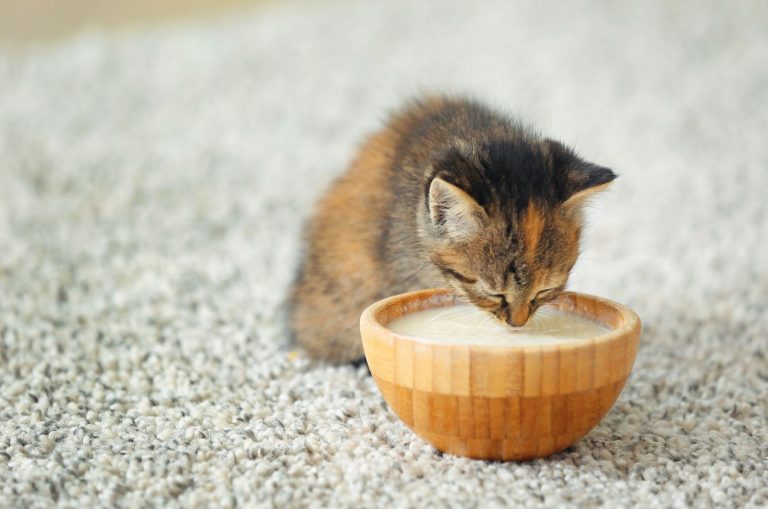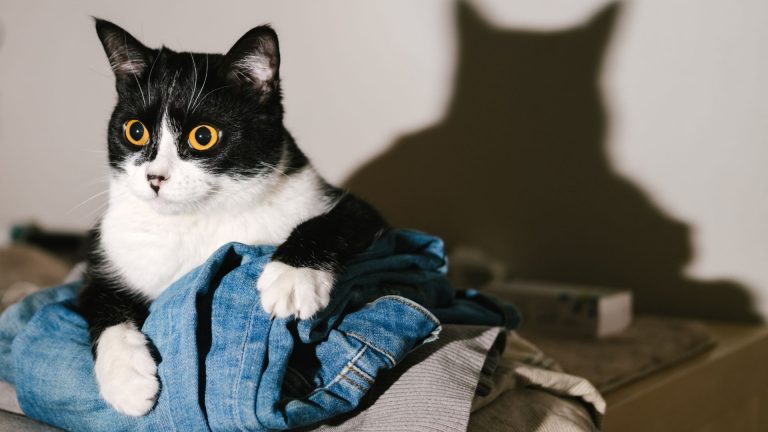Do Cats Eat Snakes? The Answer Might Surprise You!
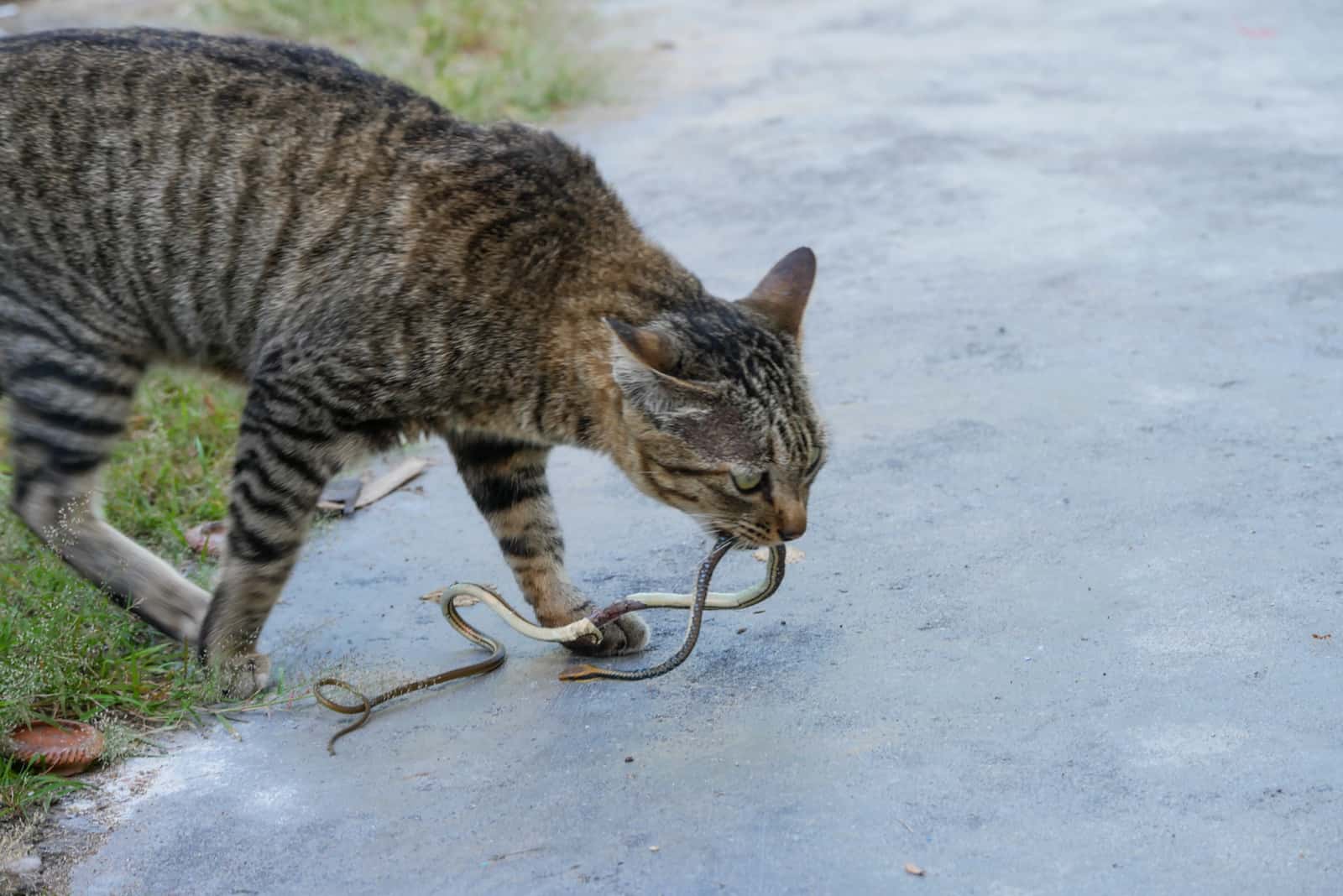
Most people perceive snakes as extremely dangerous, gnarly-looking creatures, while cats are cute, furry pets that love meowing and cuddling.
Because of this perception, it is strange to think of a cat in a face-off with a snake. However, this is certainly not the case when they do encounter one another.
Cats can fight off snakes, but do cats eat snakes? Well sometimes yes, but it is not very common!
Most of us forget the fact that cats are natural-born hunters and are amazing at seeking out prey. They are one of the best hunters and predators in the animal kingdom!
Our sweet domestic cats are some of the most effective predators in the world, able to hunt and kill thousands of species. Snakes are one of them!
Do Cats Eat Snakes?
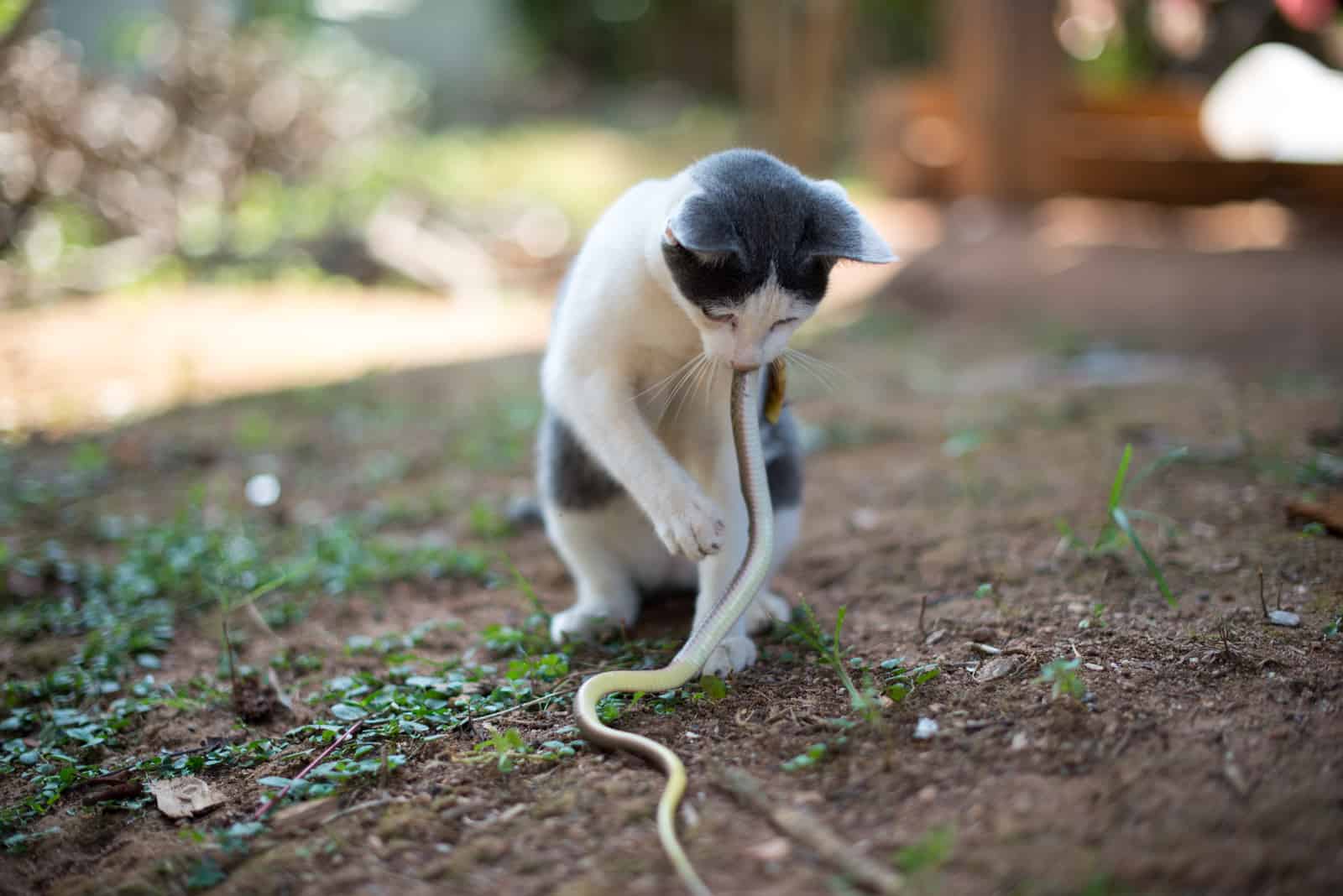
Let’s answer two important questions here:
• Can a cat eat a snake? Yes, a cat is capable of eating a small snake.
• Will a cat eat a snake? Probably not!
When a cat comes into contact with a snake, its instincts are not to kill in order to eat it, but rather to fight off the snake!
This is why we won’t usually find cats eating snakes. A snake is not an appetizing snack for a cat. Some might chew on a defeated snake a little, but eating the entire thing is very unlikely.
Generally, snakes and cats try to stay away from one another, considering they are natural enemies. However, snakes are more afraid of cats than cats are of snakes, so snakes will avoid conflict at any cost and will try to get away as soon as possible!
For this reason, cats don’t really get many chances to kill a snake, let alone eat it.
Your Cat Ate A Snake – Should You Be Worried?
There are two things that pose a health hazard for your cat if it has eaten a snake; bacteria and toxins (or venom).
Let’s look a little deeper into each of these;
1. Bacteria And Other Microorganisms
Snakes can carry a bacterium called Salmonella naturally in their gut without it making them sick. There is a risk that if your cat eats a snake, it will also ingest this nasty bacteria, which may lead to an infection.
Symptoms of Salmonella infection in cats are:
• diarrhea
• fever
• vomiting
• tiredness
• drooling
Apart from this Salmonella, snakes also carry many other bacteria, parasites, viruses, and worms.
These are all potential hazards that can lead to a wide range of feline health problems!
2. Snake Poison
People use the terms poison and venom interchangeably, but they have different meanings.
Let’s quickly answer one simple question: What is snake poison and what is snake venom?
Snake poison is a toxin that gets into the body by swallowing it.
Snake venom is a toxin that gets into the body (most importantly the bloodstream) through bite or a sting.
So, if your cat has eaten a snake, your primary concern will be snake poison. Poisonous snakes release their toxins when they are eaten.
The truth is that not a lot of snakes are actually poisonous. Most of them are venomous, so you should be more concerned if your cat has been bitten!
What Should I Do If My Cat Eats A Venomous Snake?
Don’t panic if your cat has eaten a venomous snake – the snake is (in majority of cases) not going to be deadly for your cat.
A venomous snake bite is many times more dangerous than actually eating a venomous snake.
However, if your cat has eaten a snake, you should go visit a vet just to make sure everything is okay. By doing so, you may be able to prevent your cat from experiencing any unpleasant symptoms caused by the toxins.. The vet will administer the appropriate medication to treat your cat.
Can Cats Kill Snakes?
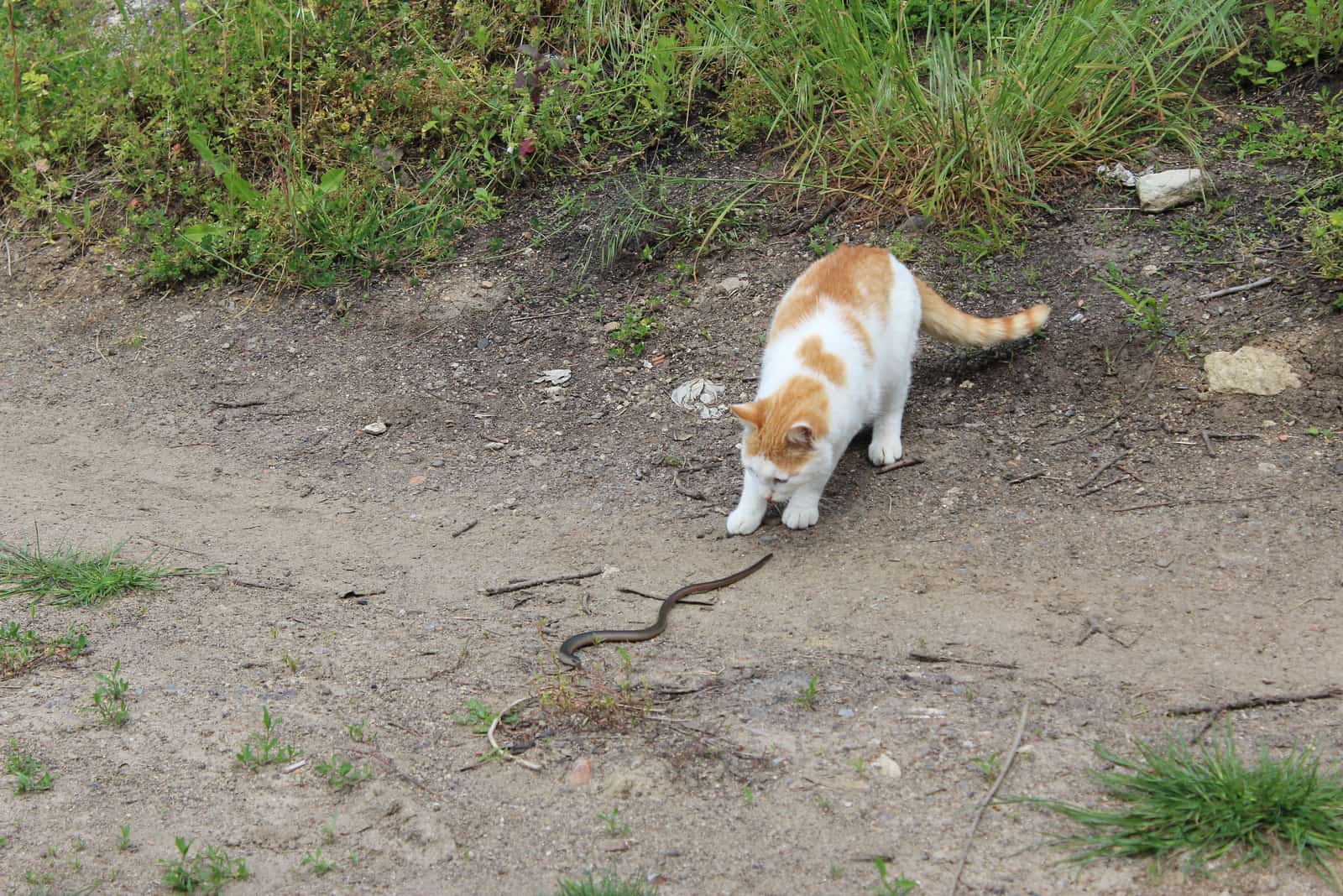
The answer to this question depends on the size of the snake. Most people would say that the “border” is a 6 foot snake. What do I mean by that’?
Cats are much more likely to be able to kill snakes that are smaller than 6 feet (so called “small snakes”), while killing a snake over 6 feet is likely to be an impossible task for a cat!
It makes sense that the main factor in whether or not a cat can defeat a snake will be the size difference between the two. A small cat cannot possibly kill an adult python.
At large size differences – the tables turn! The cats actually become the prey!
Below, smaller (cat-safe) snakes are listed, as well as large (cat-unsafe) snakes are listed.
Which Snakes Can A Cat Kill?
List of small snakes cats have no trouble killing:
• king snakes
• rat snakes
• corn snakes
• gopher snakes
• garter snakes
Snakes A Cat Can Not Kill
The snakes that a cat would be best to leave alone would be any that are much larger than the cat itself, such as:
• pythons (such as ball python, burmese python)
• boas (boa constrictor, boa imperator)
• anacondas
These snakes are known to kill prey much larger than themselves, such as antelopes sothey don’t have to eat for weeks or months!
Is It Safe For A Cat To Kill A Snake?
The answer is both a Yes and a No. It depends on the circumstances.
Why YES
A few reasons why it’s pretty safe for your feline pet to kill a snake:
1. Small snakes are easy prey.
A cat can, with no great effort, tear up a small snake. Cats are bigger than their prey in this case, so a win is fairly certain. Cats are extremely efficient hunters, so killing a small snake is not a difficult task.
Issues can arise if the snake is venomous. In this case, the size doesn’t matter much – your cat is in a dangerous situation!
2. They have a high tolerance to snake venom!
Cats have a considerably higher tolerance to snake venom when compared to other animals. So if a cat is bitten by a poisonous snake, it is probably not going to be fatal.
However, make no mistake – high tolerance does not mean resistance!
If your cat is bitten, it is recommended that you take it to visit a vet immediately. Your vet might administer an antivenom or some other form of therapy to prevent serious illness.
3. Their claws (and teeth) are a very effective killing tool!
A cat’s claws are very sharp and they spend a lot of time keeping them sharp and healthy. They use these claws for climbing trees and killing prey. The way a cat kills is by sticking their sharp claws into the snake’s body. Your cat can also bite the snake! A number of these puncture wounds eventually lead to the death of the snake.
Why NO
There are several reasons why killing a snake is a dangerous situation to get into:
1. Cats have no way of telling if a snake is extremely venomous or not!
Yes, cats do have a high tolerance to snake venom, but they are not completely tolerant. This means your pet can actually die of a snakebite, no matter how tolerant your cat might be.
Because of this, any type of confrontation with a snake is a potentially dangerous situation. As you already know, small snakes can be very dangerous too! So, even though your cat sees a small snake as easy prey, it can be a fatal encounter.
2.Your cat’s claws might be freshly trimmed and therefore, not sharp at all!
Cats kill their prey by inflicting scratches and deep wounds. What happens when their most important “weapons” aka the claws are not sharp enough to be efficient at their task? Blunt claws can put your cat in a very dangerous position.
3. The snake might be much larger than the cat, which is a significant advantage for the snake.
Your cat is smart enough to know not to get involved in a battle with an animal much larger than itself. House cats are unlikely to try to hunt animals much bigger than themselves, as they know it’s a losing battle.
See Also: Do Cats Eat Lizards? Important Things To Know
Is Snake Venom Deadly For Cats?
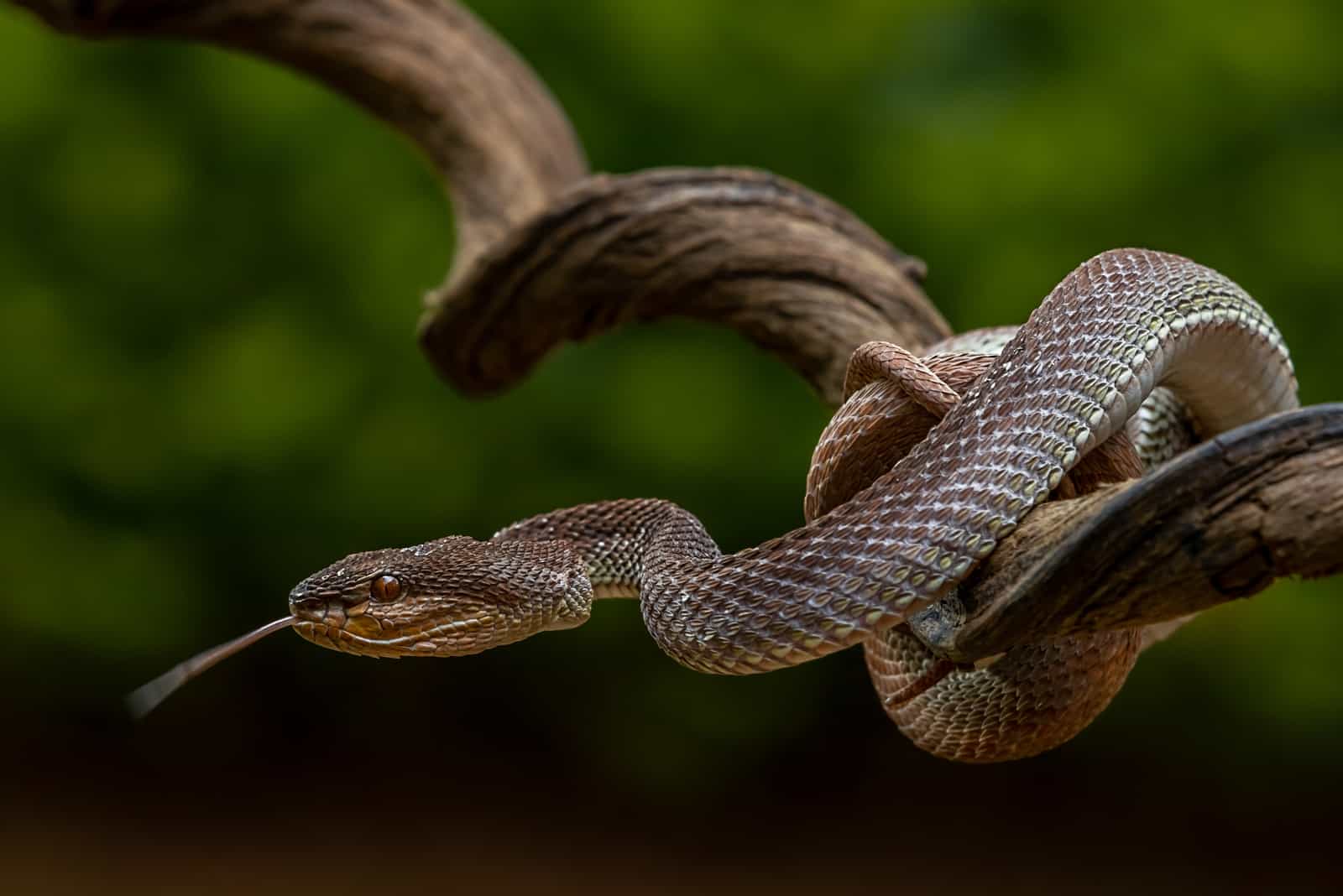
Yes, snake venom can be deadly for cats and other pets. Different types of venom have different modes of action. For example, some make blood clotting impossible, while others cause the blood to clot very quickly. Either way, venom should always be taken very seriously, because the outcome of a venomous bite can be fatal.
Fortunately, cats are surprisingly resilient to snake venom!
One study investigated the effect of eastern brown snake venom on dogs compared to the same venom on cats. The results showed that 66% of cats survived, while only 31% of dogs survived.
This suggests that cats are twice as likely as dogs to survive being bitten by a snake.
Cats also respond to antivenom treatment better than dogs, which increases their survival rate.
Another characteristic of cats that makes them more likely to survive a snake bite is the fact that they are not as active as dogs.
This is good news in this scenario, because being less active means venom is not moving through the body as quickly as it would in a more active animal.
Despite the good chances your cat would have in an encounter with a rattlesnake for example, please avoid it!
Although a cat is not likely to die, symptoms are still not something you want your cat to experience! They are further listed below.
11 Signs Your Cat Had Been Bitten By A Venomous Snake!
Even though cats are very resilient to snake venom, this does not mean that they are perfectly safe from it. Yes, they will most likely survive being bitten, but symptoms may still occur.
Below is a list of symptoms your cat might experience after being bitten by a venomous snake:
• weakness
• lethargy
• loss of appetite
• shaking
• shivering
• loss of bladder control
• loss of bowel control
• having difficulty breathing
• collapsing
• paralysis
If you observe any of these, visit your vet! They will know what to do.
If you saw the type of snake that bit your cat, try to remember it and give the vet a description. If you can identify the snake, it will be much easier for the vet to give your pet the treatment it needs in good time.
How Come Cats Are Not Afraid Of Snakes?
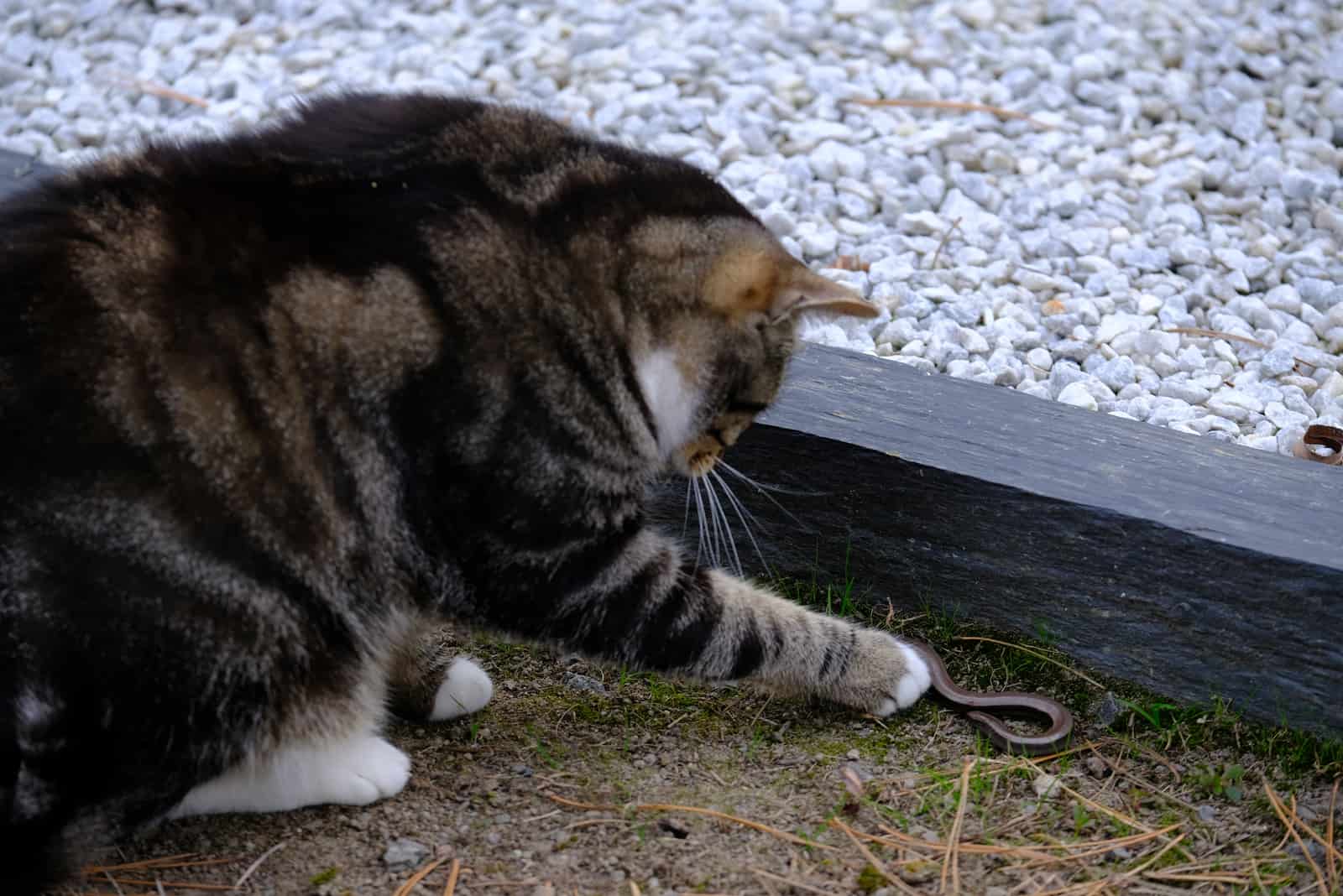
Cat lovers often forget the wild origin and nature of cats. They are not just the cute pets that we like to play with.
Their ancestry is wild, their natural habitat is the wilderness and they are natural hunters!
Their hunting skills are well developed and they are extremely efficient predators!
Your outdoor cat can easily tear apart a snake with its sharp claws, so naturally snakes will be easily frightened by a cat’s presence!
A cat will probably not be afraid of a snake if they see it for the first time! A cat will immediately go into its “exploration mode”, where there’s no room for fear.
However, it must be said that not all cats are like this, some can fear snakes, especially the bigger ones.
Interesting Read: Can Cats Eat Lightning Bugs (Fireflies)?
Can You Keep Your Cat As A “Snake Repellent”?
This depends on your cat’s personality.
If your cat is quite in tune with its wild ancestry, it will be quite efficient in keeping snakes away.
These types of outdoor cats are extremely territorial and will not allow intruders to invade their territory. You can be pretty sure that, if your cat notices a snake, it will confront it.
On the other hand, what happens when your cat is not around to notice a snake lurking? Let’s say your cat is off playing somewhere else as the snake enters your yard. Cats will roam away from the house and for this reason, you cannot rely on a cat to be the only means of getting rid of snakes from your home or yard.
There is also the possibility of your cat simply not caring. Some cats might be more “chill” when it comes to the presence of snakes in their proximity.
As I am sure you can already conclude, if your cat is this type of cat – it will be terrible at its job of repelling snakes!
How can you make your property less snake-friendly??
• keep your grass trimmed (tall grass is a good hiding place for snakes).
• remove leaves and branches (piles of leaves or branches are also a good hiding place).
• do not keep food (such as pet food) outside because it attracts snakes.
• avoid using large rocks as decorations (snakes like rocks as they provide shade and cover).
• make sure your yard has no rodents and do not feed birds (these are prey for snakes).
• don’t overwater your lawn – snakes like moist places.
• try using snake-repellent chemicals.
Can Snakes Eat Cats?
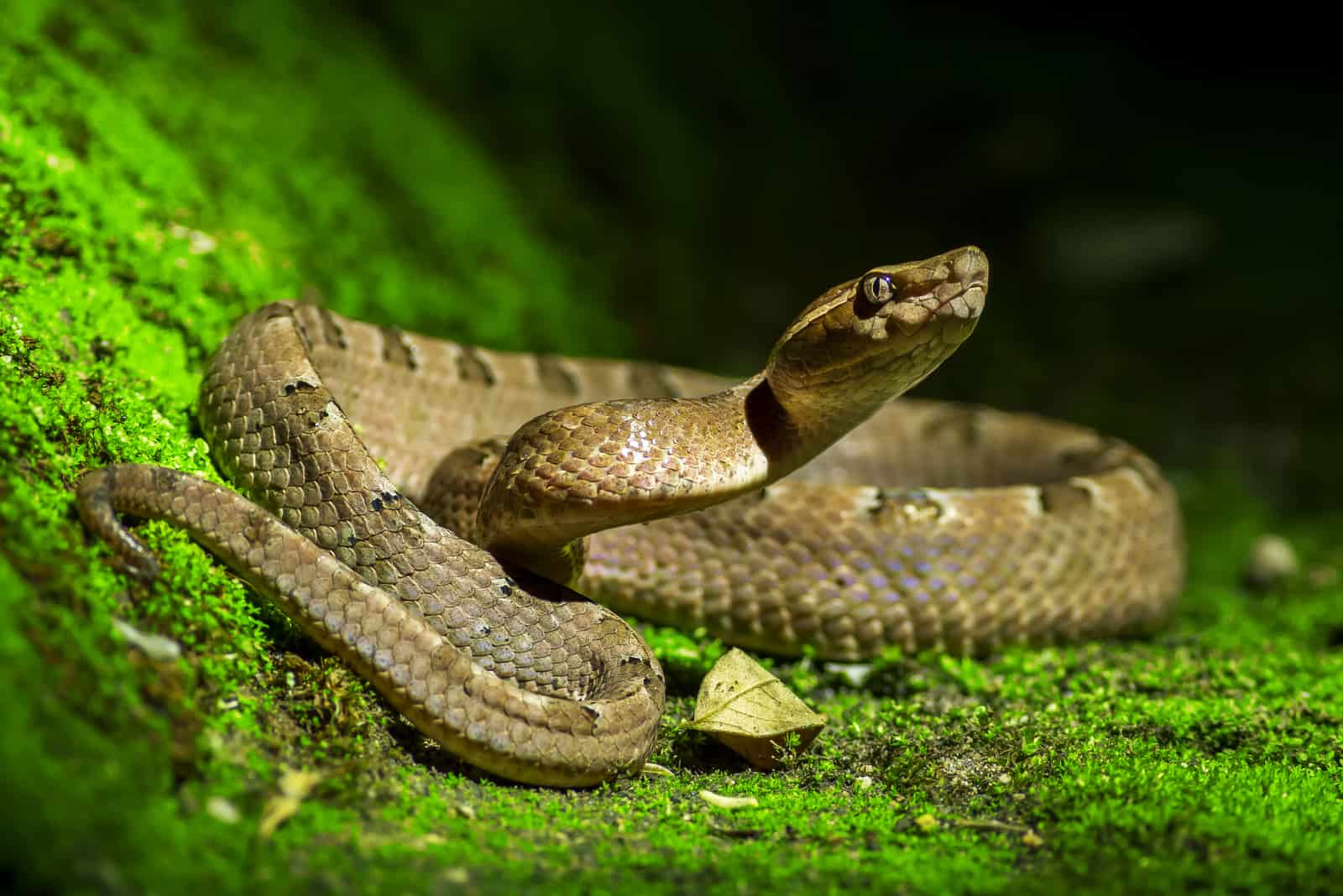
Yes, certain snakes can eat cats. Size here is really what matters. Only larger snakes will attack cats, either in self-defense or potentially as a meal.
When we are talking about snakes eating cats, it’s important to say that this is not a very likely scenario!
There aren’t many documented cases of snakes eating cats, mostly because large snakes are uncommon and cats are not their usual food choice.
You are not likely to find a huge snake such as a boa or a python roaming your yard, so it is pretty safe to say your cat is safe from being eaten by a snake (but it’s not completely impossible)!
Another interesting thing to mention is that snakes are repelled by the smell of cat urine. When a snake senses the smell of urine, it signals to the snake to leave the territory, which is exactly what cats want.
Suggested: Do Owls Eat Cats? 6 Ways To Keep Your Kitty Safe
Can You Keep A Cat And A Snake Together As Pets?
Not a lot of pet owners are keen on the idea of keeping a cat and a snake together.
Do cats eat snakes? Do snakes eat cats? The answer is yes to both. So why would you keep them together?
Well, you can keep them together, but not close to each other! If you really want to have both pets, you need to keep them separated at all times.
For example, if a cat is wandering around the house, the snake should not be free but rather in its enclosure. In no case should the two animals be free around each other. If the snake is free, keep the cat in another room with the door closed.
Snakes kept as pets are usually small, so they can be prey for the cat. This creates a dangerous situation for your pet snake, considering your cat has instincts telling it to attack the snake.
If you keep a large snake as a pet, then the cat can become the prey and the snake can kill the cat!
Essentially, you can keep a cat and a snake in the same home as pets, but they cannot be loose in the same space.
The most important thing is to keep them separate and prevent any contact!
There is no chance of a cat and a snake becoming friends. You will never see those two pets cuddling and playing. They are competitors, enemies and possibly prey for one another.
They are both carnivores and hunt the same small animals (such as mice, rats, rabbits, birds, lizards…) so in the wild they would be competitors, making them natural enemies.
Of course, there are always exceptions where the two pets do not pose a threat to one another in the same household. The thing is, you just never know! It is better to be safe than sorry, so much better to keep them separated at all times!
FAQ
Are Snakes Scared Of Cats?
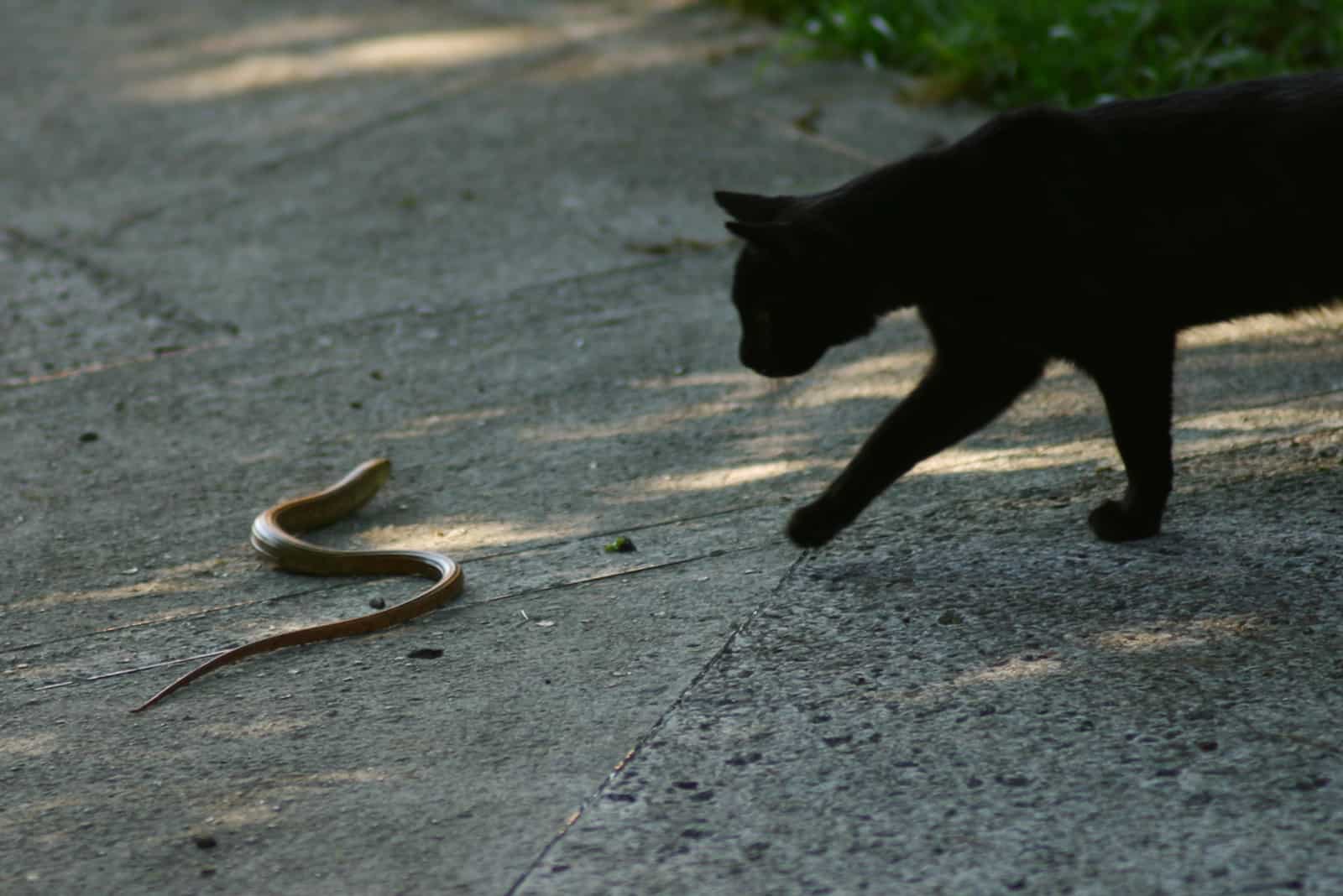
The answer is YES! This might not be an answer you’re expecting. After all, how can scary-looking slithering snakes (I am sorry if you’re a snake-lover!) be afraid of cute little cats?
Yet it is true that snakes are more likely to be scared of cats, than cats being scared of snakes.
Snakes are easily frightened and will generally try to avoid all conflict, so they will attempt to escape as soon as they sense danger.
On the other hand, cats are more confrontational. They do not run away the first chance they get, and tend to be more curious. Cats are typically quite brave in confronting other creatures or seeking out prey. Are All Snakes Afraid Of Cats?
This depends on the type of snake.
We can be pretty sure that a 25-pound boa would not be afraid of an 8-pound cat. Size is on its side!
Are Snakes Safe Around Cats?
Small snakes do not stand a chance against cats. If a cat decides to kill the snake, it will do so.
The cat may choose not to engage in a confrontation, so the snake may be able to get away. Snakes will usually do so if they have any chance!
Keeping them as pets is a possibility, but they need to be separated at all times!
Large snakes are not the prey but rather a predator. Cats are prey to boas, pythons and similar large snakes.
I guess we could say the bigger the snakes, the more safe it is around cats!
What Would Happen If A Cat Caught A Snake?
Your cat’s survival instincts are always on! Cats have an amazing sense of hearing and smell (much better than humans).
Let’s say your cat senses something odd is happening – there is an intruder in the cat’s territory. It will immediately be on the alert and go to check what’s happening.
When it notices a snake, your cat recognises it as prey and immediately goes into hunting mode. It will stalk the snake and start circling around it.
What happens next depends on the snake’s reaction. The more aggressive and agitated the snake is, the higher the chances that your cat will attack and eventually kill the snake, especially if it is eager to get away.
Essentially, there are only two options:
a) your cat allows the snake to escape (sometimes avoiding conflict is better)
b) your cat kills the snake (and in most cases will not eat the snake)
What Do Cats Think Of Snakes?
You might expect cats to be scared to death of snakes (as many humans are). But this is far from the truth.
Cats are not easily intimidated by snakes! This is especially true for cats that have never seen a snake before. They will find the snake interesting and will look to explore the situation as much as possible.
The only problem is if they run into venomous snakes. North America has more than 20 venomous species of snakes. Cats have no way of telling if a snake is venomous or not, so they don’t realize the danger they might be in!
As you might conclude, cats and snakes will never be best friends. They are both predators hunting the same prey, so they are natural competitors.
It is safe to say that cats are not frightened by snakes, but they do not like them very much!
Final Thoughts
Cats can kill snakes and vice versa – snakes can kill cats.
The chances your cat has of winning a face-off with a snake depends on the kind of snake it is dealing with. Is it a small or a large snake? Is it a venomous snake or a non-venomous snake?
Cats are excellent hunters and predators, so their chances with most snakes are pretty good. Remember, most snakes they encounter are small snakes (not longer than 6 feet) and non-venomous snakes, which is good news for your pet!
A cat kills a snake by jamming its sharp claws into the snake’s body, inflicting wounds that are usually fatal.
Your feline friend is not likely to eat the snake, even though it is a possibility. A cat will most likely just nibble on some parts of the dead snake.
Ingesting a snake can lead to various infections because snakes carry a lot of different bacteria, viruses, parasites, and worms! Also, some snakes are poisonous, meaning they release their toxins after they’ve been ingested.
It’s important to say that both cats and snakes prefer avoiding conflict. This is especially true for snakes. They will get away whenever they have a chance.
Snakes are more scared of cats than cats are scared of snakes!
Nevertheless, a cat getting bitten by a snake is not something that should be taken lightly. Take your pet to the vet immediately! Cats are very resistant to snake venom, but it’s better to be extra safe.
Now you don’t have to wonder do cats eat snakes anymore!
In any case, it’s better to avoid contact between cats and snakes. Keep your yard snake-free and don’t keep them together as pets!



